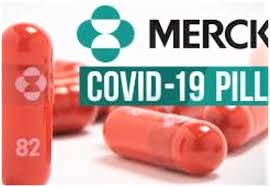On Friday, positive clinical trial results for Merck & Co’s experimental antiviral COVID-19 tablet rippled throughout the healthcare sector, sending the drugmaker’s stock price surging while denting high-flying shares of vaccine companies and developers of other coronavirus medicines.
Merck’s stock soared as much as 12.3% to its highest level since February 2020 after research revealed that the company’s drug molnupiravir could cut the risk of dying or being hospitalized in people who are most at risk of getting severe COVID-19. Experts welcomed the development as a significant step forward in the fight against COVID-19.
At the same time, shares of vaccine companies like Moderna Inc, Pfizer Inc and BioNTech SE fell, with some analysts speculating that the prospect of an oral medicine that can be used at home could shift public perceptions of COVID-19 dangers.
In a client note, Jefferies analyst Michael Yee stated, “We expect small perceived headwind to vaccine companies such as MRNA (Moderna) if the market thinks consumers will be less fearful of COVID-19 and less motivated to receive immunizations, if there is a simple medication that can treat COVID-19.”
In noon trade, Moderna shares plunged 13%, while Pfizer, which is developing its own COVID-19 tablet, dipped 1.3 percent. BioNTech’s stock declined 11% in the United States.
The Merck news provided an opportunity for Moderna investors to lock in gains following an already spectacular run. Despite Friday’s losses, shares of Moderna, which were added to the S&P 500 in mid-July, are still up 220 percent in 2021. Even after Friday’s drop, BioNTech’s stock was still up over 200 percent for the year.
According to Sahak Manuelian, head of equities trading at Wedbush Securities, the Merck news is a “wonderful cause for individuals to be taking profits off the table” in Moderna and BioNTech shares. “Given the momentum they’ve had to the upward, these moves could get exacerbated to the negative.”
Other firms that make COVID-19 vaccines, such as AstraZeneca and Novavax, saw their shares decline as well.
Companies that make COVID-19 intravenous or injection medicines, such as Regeneron Pharmaceuticals In and Gilead Sciences Inc also traded lower, with Regeneron Pharmaceuticals In down about 5% and Gilead Sciences Inc down around 2%.
In mid-day trading, healthcare was the only one of the 11 S&P 500 sectors to decrease, losing 0.5 percent.
In a research note, Piper Sandler analyst Christopher Raymond said, “We consider molnupiravir, with its oral formulation, as a clear game changer that is likely to profoundly alter not just the treatment paradigm for COVID-19 but also has potential use in the preventative setting.”
Merck is running a late-stage experiment to investigate if its antiviral pill may prevent COVID-19 infection, in addition to a research that found it can reduce hospitalization and death in individuals who have already been infected.
Merck is leading the race to create the first oral antiviral medicine for COVID-19, with its stock up roughly 9% recently. Pfizer and Roche Holding AG, a Swiss pharmaceutical company, are conducting late-stage trials with Atea Pharmaceuticals Inc. The stock of Atea was up 19%.
Merck’s shares had fallen around 4% for the year through Thursday before moving into positive territory for 2021 on Friday. Merck had halted its own COVID-19 vaccine study.
“Merck has been kind of dead in the water for investors over the last couple of quarters,” said Kevin Gade, portfolio manager at Bahl & Gaynor, which holds Merck stock. “This demonstrates that their R&D engine is still alive and well, and that they were first… in what may be a multibillion-dollar market.”

















